Volda Municipality
Volda kommune | |
|---|---|
| Volden herred (historic name) | |
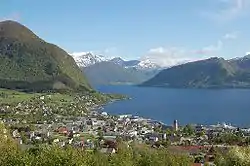 View of Volda and the Voldsfjorden | |
 Møre og Romsdal within Norway | |
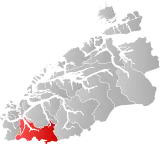 Volda within Møre og Romsdal | |
| Coordinates: 62°05′16″N 06°00′51″E / 62.08778°N 6.01417°E | |
| Country | Norway |
| County | Møre og Romsdal |
| District | Sunnmøre |
| Established | 1 Jan 1838 |
| • Created as | Formannskapsdistrikt |
| Administrative centre | Volda |
| Government | |
| • Mayor (2015) | Jørgen Amdam (Ap) |
| Area | |
| • Total | 876.85 km2 (338.55 sq mi) |
| • Land | 833.60 km2 (321.85 sq mi) |
| • Water | 43.25 km2 (16.70 sq mi) 4.9% |
| • Rank | #132 in Norway |
| Population (2022) | |
| • Total | 10,809 |
| • Rank | #106 in Norway |
| • Density | 13/km2 (30/sq mi) |
| • Change (10 years) | |
| Demonym | Volding[1] |
| Official language | |
| • Norwegian form | Nynorsk |
| Time zone | UTC+01:00 (CET) |
| • Summer (DST) | UTC+02:00 (CEST) |
| ISO 3166 code | NO-1577[3] |
| Website | Official website |
Volda is a municipality in Møre og Romsdal county, Norway. It is part of the Sunnmøre region. The administrative centre is the village of Volda. Other villages in the municipality include Dravlaus, Fyrde, Straumshamn, Leira, Bjørke, and Grodås. The municipality is located about 50 kilometres (31 mi) south of the town of Ålesund.
The 877-square-kilometre (339 sq mi) municipality is the 132nd largest by area out of the 356 municipalities in Norway. Volda is the 106th most populous municipality in Norway with a population of 10,809. The municipality's population density is 13 inhabitants per square kilometre (34/sq mi) and its population has increased by 9% over the previous 10-year period.[4][5]
General information

The municipality of Volden was established on 1 January 1838 (see formannskapsdistrikt law). The original municipality was the same as the parish (prestegjeld) of Volden, including the sub-parishes of Ørsta and Dalsfjord. On 1 August 1883, the sub-parish of Ørsta (population: 2,070) was separated from Volden to form a new municipality of its own. This left Volden with 3,485 residents. On 1 January 1893, the Ytrestølen farm in the Ørsta municipality (population: 13) was transferred to Volden municipality. In 1918, the name was changed from Volden to Volda.[6]
On 1 July 1924, the sub-parish of Dalsfjord (population: 960) was separated from Volda to become a municipality of its own. This left Volda with 4,715 residents. During the 1960s, there were many municipal mergers across Norway due to the work of the Schei Committee. On 1 January 1964, the municipalities of Dalsfjord (population: 1,151) and Volda (population: 6,056) were merged back together. The new Volda municipality had 7,207 residents.[6]
On 1 January 2020, another large municipal border adjustment took place. The neighboring municipality of Hornindal (previously in Sogn og Fjordane county) and the Bjørke and Leira areas of Ørsta were merged with Volda to make a much larger Volda Municipality (in Møre og Romsdal county).[7]
Name
The municipality (originally the parish) is named after the Voldsfjorden (Vǫld or Valdr). The meaning of the name is uncertain, but it may come from vella which means "gush" or "roar" or from another word meaning "wave". It could be compared with the welle which means "wave".[8] Historically, the name of the municipality was spelled Volden. On 3 November 1917, a royal resolution changed the spelling of the name of the municipality to Volda.[9]
Coat of arms
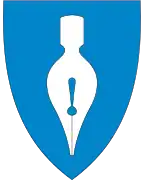
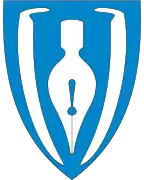
The original coat of arms was granted on 19 June 1987 and they were in use until 1 January 2020 when the municipality was greatly enlarged. The official blazon was "Azure, a downwards pointing fountain pen nib argent" (Norwegian: På blå grunn ein nedvend sølv pennesplitt). This means the arms had a blue field (background) and the charge was the tip of a fountain pen. The charge had a tincture of argent which means it was commonly colored white, but if it was made out of metal, then silver was used. This design was chosen to symbolize the long history of education in Volda–it was the site of the first secondary school outside of a major city in Norway. The arms were designed by Inge Rotevatn. The municipal flag has the same design as the coat of arms.[10][11][12]
The current coat of arms was approved in 2019 for use starting on 1 January 2020 when Hornindal Municipality and part of Ørsta Municipality were added to Volda. The official blazon is "Azure, a downwards pointing fountain pen nib flanked by two scythes endorsed argent". This means the arms have a blue field (background) and the charge is the tip of a fountain pen with a scythe on each side. The charge has a tincture of argent which means it is commonly colored white, but if it is made out of metal, then silver is used. The arms from 1987 were modified by adding two scythes on either side of the tip of a fountain pen. The scythes were taken from the old arms of the former municipality of Hornindal. Hornindal historically had large numbers of smiths and their scythe production was well known in the wider region. The municipal flag has the same design as the coat of arms.[10][13]
Churches

The Church of Norway has six parishes (sokn) within the municipality of Volda. It is part of the Søre Sunnmøre prosti (deanery) in the Diocese of Møre.
| Parish (sokn) | Church name | Location of the church | Year built |
|---|---|---|---|
| Austefjord | Austefjord Church | Fyrde | 1773 |
| Dalsfjord | Dalsfjord Church | Dravlaus | 1910 |
| Hornindal | Hornindal Church | Grodås | 1856 |
| Kilsfjord | Kilsfjord Church | Straumshamn | 1974 |
| Storfjorden | Bjørke Church | Bjørke | 1919 |
| Volda | Volda Church | Volda | 1932 |
Geography
Volda's main geographical feature is the Voldsfjorden which branches off into the Austefjorden, Kilsfjorden, and Dalsfjorden. It is also mountainous, particularly southeast of the fjords, with the Sunnmørsalpene mountains surrounding the region. The 1,482-metre (4,862 ft) tall mountain Eidskyrkja is located in the southeastern part of the municipality.
Volda is bordered by municipalities of: Vanylven Municipality to the south-west/west; Herøy and Ulstein (only by sea) to the west; Ørsta to the north and east; and Stryn and Stad, in Vestland county, to the south.
The dominant centre, both in terms of population and administration, is the village of Volda, in the northernmost part of the municipality. Other population concentrations include Mork, Ekset, Folkestad, Fyrde, Steinsvika, Lauvstad, Bjørkedal, Grodås, and Straumshamn.
Some of the mountains in Volda include Hornindalsrokken, Kvitegga, and Jakta.
Climate
| Climate data for Volda | |||||||||||||
|---|---|---|---|---|---|---|---|---|---|---|---|---|---|
| Month | Jan | Feb | Mar | Apr | May | Jun | Jul | Aug | Sep | Oct | Nov | Dec | Year |
| Mean daily maximum °C (°F) | 0 (32) |
1 (34) |
3 (37) |
5 (41) |
10 (50) |
13 (55) |
14 (57) |
15 (59) |
11 (52) |
8 (46) |
3 (37) |
1 (34) |
7 (45) |
| Daily mean °C (°F) | −1.5 (29.3) |
−1 (30) |
0 (32) |
2 (36) |
7 (45) |
10 (50) |
11 (52) |
11.5 (52.7) |
8.5 (47.3) |
6 (43) |
1 (34) |
−1 (30) |
4.5 (40.1) |
| Mean daily minimum °C (°F) | −3 (27) |
−3 (27) |
−3 (27) |
−1 (30) |
4 (39) |
7 (45) |
8 (46) |
8 (46) |
6 (43) |
4 (39) |
−1 (30) |
−3 (27) |
2 (36) |
| Average precipitation mm (inches) | 188 (7.4) |
146 (5.7) |
154 (6.1) |
100 (3.9) |
77 (3.0) |
95 (3.7) |
117 (4.6) |
136 (5.4) |
238 (9.4) |
237 (9.3) |
218 (8.6) |
237 (9.3) |
1,943 (76.4) |
| Average precipitation days | 25 | 22 | 22 | 19 | 16 | 17 | 21 | 22 | 26 | 25 | 25 | 27 | 267 |
| Mean monthly sunshine hours | 14 | 39 | 86 | 136 | 200 | 197 | 171 | 151 | 80 | 58 | 28 | 0 | 1,159 |
| Source: World Climate Guide[14] | |||||||||||||
Government
Volda Municipality is responsible for primary education (through 10th grade), outpatient health services, senior citizen services, welfare and other social services, zoning, economic development, and municipal roads and utilities. The municipality is governed by a municipal council of directly elected representatives. The mayor is indirectly elected by a vote of the municipal council.[15] The municipality is under the jurisdiction of the Møre og Romsdal District Court and the Frostating Court of Appeal.
Municipal council
The municipal council (Kommunestyre) of Volda is made up of 33 representatives that are elected to four year terms. The tables below show the current and historical composition of the council by political party.
| Party name (in Nynorsk) | Number of representatives | |
|---|---|---|
| Labour Party (Arbeidarpartiet) | 4 | |
| Progress Party (Framstegspartiet) | 2 | |
| Green Party (Miljøpartiet Dei Grøne) | 2 | |
| Conservative Party (Høgre) | 6 | |
| Christian Democratic Party (Kristeleg Folkeparti) | 3 | |
| Red Party (Raudt) | 1 | |
| Centre Party (Senterpartiet) | 7 | |
| Socialist Left Party (Sosialistisk Venstreparti) | 3 | |
| Liberal Party (Venstre) | 2 | |
| Volda List (Voldalista) | 3 | |
| Total number of members: | 33 | |
| Party name (in Nynorsk) | Number of representatives | |
|---|---|---|
| Labour Party (Arbeidarpartiet) | 6 | |
| Progress Party (Framstegspartiet) | 4 | |
| Green Party (Miljøpartiet Dei Grøne) | 1 | |
| Conservative Party (Høgre) | 3 | |
| Christian Democratic Party (Kristeleg Folkeparti) | 6 | |
| Centre Party (Senterpartiet) | 3 | |
| Socialist Left Party (Sosialistisk Venstreparti) | 2 | |
| Liberal Party (Venstre) | 2 | |
| Total number of members: | 27 | |
| Party name (in Nynorsk) | Number of representatives | |
|---|---|---|
| Labour Party (Arbeidarpartiet) | 4 | |
| Progress Party (Framstegspartiet) | 4 | |
| Conservative Party (Høgre) | 4 | |
| Christian Democratic Party (Kristeleg Folkeparti) | 5 | |
| Centre Party (Senterpartiet) | 3 | |
| Socialist Left Party (Sosialistisk Venstreparti) | 2 | |
| Liberal Party (Venstre) | 3 | |
| Ferry list (Ferjelista) | 2 | |
| Total number of members: | 27 | |
| Party name (in Nynorsk) | Number of representatives | |
|---|---|---|
| Labour Party (Arbeidarpartiet) | 4 | |
| Progress Party (Framstegspartiet) | 5 | |
| Conservative Party (Høgre) | 3 | |
| Christian Democratic Party (Kristeleg Folkeparti) | 5 | |
| Centre Party (Senterpartiet) | 5 | |
| Socialist Left Party (Sosialistisk Venstreparti) | 3 | |
| Liberal Party (Venstre) | 2 | |
| Total number of members: | 27 | |
| Party name (in Nynorsk) | Number of representatives | |
|---|---|---|
| Labour Party (Arbeidarpartiet) | 3 | |
| Progress Party (Framstegspartiet) | 3 | |
| Conservative Party (Høgre) | 5 | |
| Christian Democratic Party (Kristeleg Folkeparti) | 5 | |
| Centre Party (Senterpartiet) | 4 | |
| Socialist Left Party (Sosialistisk Venstreparti) | 5 | |
| Liberal Party (Venstre) | 2 | |
| Total number of members: | 27 | |
| Party name (in Nynorsk) | Number of representatives | |
|---|---|---|
| Labour Party (Arbeidarpartiet) | 4 | |
| Progress Party (Framstegspartiet) | 1 | |
| Conservative Party (Høgre) | 10 | |
| Christian Democratic Party (Kristeleg Folkeparti) | 7 | |
| Centre Party (Senterpartiet) | 6 | |
| Socialist Left Party (Sosialistisk Venstreparti) | 4 | |
| Liberal Party (Venstre) | 3 | |
| Total number of members: | 35 | |
| Party name (in Nynorsk) | Number of representatives | |
|---|---|---|
| Labour Party (Arbeidarpartiet) | 4 | |
| Progress Party (Framstegspartiet) | 1 | |
| Conservative Party (Høgre) | 8 | |
| Christian Democratic Party (Kristeleg Folkeparti) | 7 | |
| Centre Party (Senterpartiet) | 7 | |
| Socialist Left Party (Sosialistisk Venstreparti) | 3 | |
| Liberal Party (Venstre) | 4 | |
| Centrum List (Sentrumslista) | 1 | |
| Total number of members: | 35 | |
| Party name (in Nynorsk) | Number of representatives | |
|---|---|---|
| Labour Party (Arbeidarpartiet) | 5 | |
| Progress Party (Framstegspartiet) | 1 | |
| Conservative Party (Høgre) | 7 | |
| Christian Democratic Party (Kristeleg Folkeparti) | 7 | |
| Centre Party (Senterpartiet) | 7 | |
| Socialist Left Party (Sosialistisk Venstreparti) | 4 | |
| Liberal Party (Venstre) | 3 | |
| Cross-party list for the west side of the Voldsfjorden (Tverrpolitisk liste for vestsida av Voldsfjorden) | 1 | |
| Total number of members: | 35 | |
| Party name (in Nynorsk) | Number of representatives | |
|---|---|---|
| Labour Party (Arbeidarpartiet) | 6 | |
| Conservative Party (Høgre) | 8 | |
| Christian Democratic Party (Kristeleg Folkeparti) | 6 | |
| Centre Party (Senterpartiet) | 4 | |
| Socialist Left Party (Sosialistisk Venstreparti) | 2 | |
| Liberal Party (Venstre) | 6 | |
| Kindergarten List (Barnehagelista) | 1 | |
| Non-party election list for the west side of the Voldsfjorden (Upolitisk valliste for Vestsida av Voldsfjorden) | 2 | |
| Total number of members: | 35 | |
| Party name (in Nynorsk) | Number of representatives | |
|---|---|---|
| Labour Party (Arbeidarpartiet) | 6 | |
| Conservative Party (Høgre) | 5 | |
| Christian Democratic Party (Kristeleg Folkeparti) | 8 | |
| Centre Party (Senterpartiet) | 6 | |
| Socialist Left Party (Sosialistisk Venstreparti) | 2 | |
| Liberal Party (Venstre) | 5 | |
| Non-party election list for the west side of the Voldafjord (Upolitisk valliste for Vestsida av Voldafjorden) | 3 | |
| Total number of members: | 35 | |
| Party name (in Nynorsk) | Number of representatives | |
|---|---|---|
| Labour Party (Arbeidarpartiet) | 4 | |
| Conservative Party (Høgre) | 6 | |
| Christian Democratic Party (Kristeleg Folkeparti) | 7 | |
| Centre Party (Senterpartiet) | 6 | |
| Socialist Left Party (Sosialistisk Venstreparti) | 1 | |
| Liberal Party (Venstre) | 6 | |
| Election list for Dravlausbygda and Innselset area (Valliste for Dravlausbygda og Innselset krins) | 1 | |
| Local list for Lid and Yksnøy (Krinsliste for Lid og Yksnøy) | 1 | |
| Non-party list for the Mork area (Upolitisk liste for Mork krins) | 1 | |
| Non-party list for the west side of the Voldsfjorden (Upolitisk liste for Vestsida av Voldsfjorden) | 2 | |
| Total number of members: | 35 | |
| Party name (in Nynorsk) | Number of representatives | |
|---|---|---|
| Labour Party (Arbeidarpartiet) | 5 | |
| Conservative Party (Høgre) | 3 | |
| Christian Democratic Party (Kristeleg Folkeparti) | 8 | |
| New People's Party (Nye Folkepartiet) | 1 | |
| Centre Party (Senterpartiet) | 8 | |
| Socialist Left Party (Sosialistisk Venstreparti) | 1 | |
| Liberal Party (Venstre) | 6 | |
| Election list for Mork (Valliste for Mork) | 1 | |
| Local list for Lid og Yksnøy (Krinsliste for Lid og Yksnøy) | 1 | |
| Non-party election list for Folkestad, Høydal, Fylsvik and the Bjørkedal area (Upolitisk Valliste for Folkestad, Høydal, Fylsvik og Bjørkedal Krins) | 1 | |
| Total number of members: | 35 | |
| Party name (in Nynorsk) | Number of representatives | |
|---|---|---|
| Labour Party (Arbeidarpartiet) | 6 | |
| Conservative Party (Høgre) | 2 | |
| Christian Democratic Party (Kristeleg Folkeparti) | 7 | |
| Centre Party (Senterpartiet) | 10 | |
| Liberal Party (Venstre) | 8 | |
| Local List(s) (Lokale lister) | 2 | |
| Total number of members: | 35 | |
| Party name (in Nynorsk) | Number of representatives | |
|---|---|---|
| Labour Party (Arbeidarpartiet) | 7 | |
| Conservative Party (Høgre) | 3 | |
| Christian Democratic Party (Kristeleg Folkeparti) | 6 | |
| Centre Party (Senterpartiet) | 7 | |
| Liberal Party (Venstre) | 9 | |
| Local List(s) (Lokale lister) | 3 | |
| Total number of members: | 35 | |
| Party name (in Nynorsk) | Number of representatives | |
|---|---|---|
| Labour Party (Arbeidarpartiet) | 6 | |
| Conservative Party (Høgre) | 2 | |
| Christian Democratic Party (Kristeleg Folkeparti) | 5 | |
| Centre Party (Senterpartiet) | 6 | |
| Liberal Party (Venstre) | 8 | |
| Local List(s) (Lokale lister) | 8 | |
| Total number of members: | 35 | |
| Party name (in Nynorsk) | Number of representatives | |
|---|---|---|
| Labour Party (Arbeidarpartiet) | 4 | |
| Conservative Party (Høgre) | 1 | |
| Centre Party (Senterpartiet) | 2 | |
| Liberal Party (Venstre) | 5 | |
| Local List(s) (Lokale lister) | 15 | |
| Total number of members: | 27 | |
| Party name (in Nynorsk) | Number of representatives | |
|---|---|---|
| Labour Party (Arbeidarpartiet) | 4 | |
| Conservative Party (Høgre) | 1 | |
| Christian Democratic Party (Kristeleg Folkeparti) | 3 | |
| Farmers' Party (Bondepartiet) | 2 | |
| Liberal Party (Venstre) | 4 | |
| Local List(s) (Lokale lister) | 13 | |
| Total number of members: | 27 | |
| Party name (in Nynorsk) | Number of representatives | |
|---|---|---|
| Labour Party (Arbeidarpartiet) | 3 | |
| Local List(s) (Lokale lister) | 21 | |
| Total number of members: | 24 | |
| Party name (in Nynorsk) | Number of representatives | |
|---|---|---|
| Labour Party (Arbeidarpartiet) | 4 | |
| Local List(s) (Lokale lister) | 20 | |
| Total number of members: | 24 | |
| Party name (in Nynorsk) | Number of representatives | |
|---|---|---|
| Labour Party (Arbeidarpartiet) | 6 | |
| Joint List(s) of Non-Socialist Parties (Borgarlege Felleslister) | 1 | |
| Local List(s) (Lokale lister) | 17 | |
| Total number of members: | 24 | |
| Party name (in Nynorsk) | Number of representatives | |
|---|---|---|
| Labour Party (Arbeidarpartiet) | 6 | |
| Local List(s) (Lokale lister) | 18 | |
| Total number of members: | 24 | |
| Note: Due to the German occupation of Norway during World War II, no elections were held for new municipal councils until after the war ended in 1945. | ||
Mayors
The mayors (Nynorsk: ordførar) of Volda:
- 1838–1839: Sjur H. Halkjelsvik
- 1840–1841: Peder E. Schjelderup
- 1842–1845: Sjur H. Halkjelsvik
- 1846–1849: Anders Velle
- 1850–1857: Mauritz Aarflot (V)
- 1858–1859: Rasmus R. Aarflot
- 1860–1885: Mauritz Aarflot (V)
- 1886–1887: Rasmus R. Aarflot
- 1888–1889: Rasmus Barstad
- 1890–1893: Rasmus Mork
- 1894–1904: Laurits Barstad
- 1905–1910: Oscar Normann Eng (V)
- 1911–1913: Anders Vassbotn (V)
- 1914–1916: Ola S. Rotevatn
- 1917–1919: Henrik Kårstad (V)
- 1920–1931: Ola S. Rotevatn (Bp)
- 1932–1934: Ola Drabløs
- 1935–1937: Ola R. Heltne
- 1938–1941: Johan Alvestad (Ap)
- 1941–1945: Maurits Aarflot (NS)
- 1945–1945: Johan Alvestad (Ap)
- 1946–1946: Ola Drabløs
- 1946–1947: Georg Rønnestad (Ap)
- 1947–1947: Henrik Driveklepp
- 1948–1951: Martin Dahl (V)
- 1952–1955: Johannes Nes (V)
- 1956–1959: Per Longva (Ap)
- 1960–1967: Karl Alme (V)
- 1968–1975: Sigurd H. Halkjelsvik (Sp)
- 1976–1979: Eilert Bø (KrF)
- 1980–1987: Rasmus R. Aarflot (Sp)
- 1988–2003: Knut Bere (H)
- 2003–2011: Ragnhild Aarflot Kalland (Sp)
- 2011–2015: Arild Iversen (KrF)
- 2015–2019: Jørgen Amdam (Ap)
- 2019–present: Sølvi Dimmen (Sp)
Culture
Volda is primarily known for strong cultural heritage and academic traditions. A private library at Egset, the first rural of its kind in Norway, is said to have inspired the young Ivar Aasen in the 19th century. Martin Ulvestad, Norwegian–American author who published an English-Danish-Norwegian dictionary in 1895, (Engelsk-Dansk-Norsk Ordbog med fuldstændig Udtalebetegnelse) was born in Volda. The Norsk Landboeblad newspaper was based in Volda in the 1800s. Volda landsgymnas (established 1910) was the first Norwegian secondary school outside a major city. Among the most important institutions today is the Volda University College.
Volda University College (HVO) is one of 25 university colleges in Norway. HVO, with an enrollment of about 3,000 students, specializes in education of teachers, animators, and journalists. This has attracted or incubated several animation companies to Volda, whose work is highlighted in the annual Animation Volda Festival, which started at HVO in 2007.[34] HVO is host of the annual Norwegian Documentary Film Festival (a.k.a. DOKFILM), which started in 1997.[35]
The national ski festival X2 is also held in Volda during April every year.
The Volda TI sports club includes an association football team, whose home field is Volda Stadion. The football squad has consistently played in the 2. divisjon to 4. divisjon leagues (tiers three to five of the Norwegian football league system) for a number of decades.
As a logical consequence of the huge influx of students, as well as a county hospital, public services are by far the most dominant sector, representing almost 50% of economic life in Volda. Industry and agriculture are also prevalent. Bjørkedalen is noted for its tradition in building wooden boats.
The Sivert Aarflot Museum is located at Ekset in Volda.[36] Volda and its environs are featured prominently in the film Troll Hunter (2010).
Transportation
The Ørsta–Volda Airport, Hovden, is located in neighbouring municipality of Ørsta, just north of the village of Volda. The European route E39 highway passes north through the municipality on its way to the city of Ålesund. As noted, the municipality is criss-crossed by fjords; therefore, both Lauvstad and Folkestad are linked to the population centre Volda by ferry. In February 2008, the underwater Eiksund Tunnel connected the municipalities of Ulstein, Hareid, Herøy, and Sande to Ørsta and Volda. The tunnel is the deepest undersea tunnel in the world. The Kviven Tunnel was completed in 2012, connecting Fyrde to the village of Grodås to the south on the other side of a large mountain. This tunnel led to the old Hornindal Municipality joining Volda in 2020.
Notable residents
.jpg.webp)
- Martin Ulvestad (1865–1942), a Norwegian-American historian and philologist
- Peter Olai Thorvik (1873–1965), a blacksmith, fisherman, banker and politician
- Inger Hagerup (1905–1985), an author, playwright and poet; lived in Volda
- Dag Frøland (1945–2010), a comedian, revue artist, singer and impersonator [37]
- Ottar Grepstad (born 1953), a Norwegian Nynorsk writer, lives in Volda
- Olav Rune Ekeland Bastrup (born 1956), a Norwegian writer and historian
- Ragnhild Aarflot Kalland (born 1960), a local politician, Mayor of Volda 2003-2011
- Frode Grodås (born 1964), a football goalkeeper with over 250 club caps and 50 for Norway
- Simone Eriksrud (born 1970), a musician, composer and lead vocalist with D'Sound
- Asbjørn Blokkum Flø (born 1973), a Norwegian composer, musician and sound artist
- Beate S. Lech (born 1974), a jazz vocalist and lead singer of Beady Belle
- Erlend Slettevoll (born 1981), a Norwegian jazz pianist
- Jon Georg Dale (born 1984), Progress Party politician and former minister
- Ørjan Håskjold Nyland (born 1990), a football goalkeeper with over 200 club caps and 28 for Norway
Media gallery
 MF Høgsfjord utenfor Volda fergekai
MF Høgsfjord utenfor Volda fergekai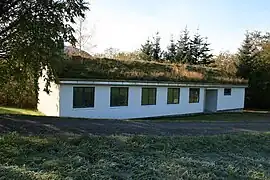 Sivert Aarflot-museet i Volda 2
Sivert Aarflot-museet i Volda 2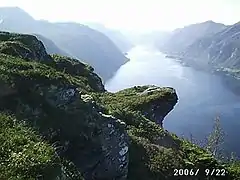 Fjellnabben Galten i Dalsfjorden
Fjellnabben Galten i Dalsfjorden.jpg.webp) Eikrem
Eikrem
References
- ↑ "Navn på steder og personer: Innbyggjarnamn" (in Norwegian). Språkrådet.
- ↑ "Forskrift om målvedtak i kommunar og fylkeskommunar" (in Norwegian). Lovdata.no.
- ↑ Bolstad, Erik; Thorsnæs, Geir, eds. (26 January 2023). "Kommunenummer". Store norske leksikon (in Norwegian). Kunnskapsforlaget.
- ↑ Statistisk sentralbyrå. "Table: 06913: Population 1 January and population changes during the calendar year (M)" (in Norwegian).
- ↑ Statistisk sentralbyrå. "09280: Area of land and fresh water (km²) (M)" (in Norwegian).
- 1 2 Jukvam, Dag (1999). Historisk oversikt over endringer i kommune- og fylkesinndelingen (PDF) (in Norwegian). Statistisk sentralbyrå. ISBN 9788253746845.
- ↑ "Nye Volda" (in Norwegian). Retrieved 20 October 2017.
- ↑ Rygh, Oluf (1908). Norske gaardnavne: Romsdals amt (in Norwegian) (13 ed.). Kristiania, Norge: W. C. Fabritius & sønners bogtrikkeri. p. 67.
- ↑ "Norsk Lovtidende. 2den Afdeling. 1917. Samling af Love, Resolutioner m.m". Norsk Lovtidend (in Norwegian). Kristiania, Norge: Grøndahl og Søns Boktrykkeri: 1057–1065. 1917.
- 1 2 "Civic heraldry of Norway - Norske Kommunevåpen". Heraldry of the World. Retrieved 15 April 2023.
- ↑ "Volda, Møre og Romsdal (Norway)". Flags of the World. Retrieved 15 April 2023.
- ↑ "Godkjenning av våpen og flagg". Lovdata.no (in Norwegian). Norges kommunal- og arbeidsdepartementet. 19 June 1987. Retrieved 15 April 2023.
- ↑ "Forslag til kommunevåpen og alle innsende forslag" (in Norwegian). NyeVolda.no. Retrieved 9 February 2020.
- ↑ "Volda Climate Guide, Norway". World Climate Guide. Retrieved 18 March 2012.
- ↑ Hansen, Tore; Vabo, Signy Irene, eds. (20 September 2022). "kommunestyre". Store norske leksikon (in Norwegian). Kunnskapsforlaget. Retrieved 14 October 2022.
- ↑ "Kommunestyrevalg 2019 – Møre og Romsdal". Valgdirektoratet. Retrieved 19 October 2019.
- 1 2 3 4 "Table: 04813: Members of the local councils, by party/electoral list at the Municipal Council election (M)" (in Norwegian). Statistics Norway.
- ↑ "Kommunestyrevalg 2011 – Møre og Romsdal". Valgdirektoratet. Retrieved 19 October 2019.
- ↑ "Kommunestyrevalget 1995" (PDF) (in Norwegian). Oslo-Kongsvinger: Statistisk sentralbyrå. 1996. Retrieved 1 May 2020.
- ↑ "Kommunestyrevalget 1991" (PDF) (in Norwegian). Oslo-Kongsvinger: Statistisk sentralbyrå. 1993. Retrieved 1 May 2020.
- ↑ "Kommunestyrevalget 1987" (PDF) (in Norwegian). Oslo-Kongsvinger: Statistisk sentralbyrå. 1988. Retrieved 1 May 2020.
- ↑ "Kommunestyrevalget 1983" (PDF) (in Norwegian). Oslo-Kongsvinger: Statistisk sentralbyrå. 1984. Retrieved 1 May 2020.
- ↑ "Kommunestyrevalget 1979" (PDF) (in Norwegian). Oslo: Statistisk sentralbyrå. 1979. Retrieved 1 May 2020.
- ↑ "Kommunevalgene 1975" (PDF) (in Norwegian). Oslo: Statistisk sentralbyrå. 1977. Retrieved 1 May 2020.
- ↑ "Kommunevalgene 1972" (PDF) (in Norwegian). Oslo: Statistisk sentralbyrå. 1973. Retrieved 1 May 2020.
- ↑ "Kommunevalgene 1967" (PDF) (in Norwegian). Oslo: Statistisk sentralbyrå. 1967. Retrieved 1 May 2020.
- ↑ "Kommunevalgene 1963" (PDF) (in Norwegian). Oslo: Statistisk sentralbyrå. 1964. Retrieved 1 May 2020.
- ↑ "Kommunevalgene og Ordførervalgene 1959" (PDF) (in Norwegian). Oslo: Statistisk sentralbyrå. 1960. Retrieved 1 May 2020.
- ↑ "Kommunevalgene og Ordførervalgene 1955" (PDF) (in Norwegian). Oslo: Statistisk sentralbyrå. 1957. Retrieved 1 May 2020.
- ↑ "Kommunevalgene og Ordførervalgene 1951" (PDF) (in Norwegian). Oslo: Statistisk sentralbyrå. 1952. Retrieved 1 May 2020.
- ↑ "Kommunevalgene og Ordførervalgene 1947" (PDF) (in Norwegian). Oslo: Statistisk sentralbyrå. 1948. Retrieved 1 May 2020.
- ↑ "Kommunevalgene og Ordførervalgene 1945" (PDF) (in Norwegian). Oslo: Statistisk sentralbyrå. 1947. Retrieved 1 May 2020.
- ↑ "Kommunevalgene og Ordførervalgene 1937" (PDF) (in Norwegian). Oslo: Statistisk sentralbyrå. 1938. Retrieved 1 May 2020.
- ↑ "Animation Volda Festival: About Us". Animation Volda Festival. Retrieved 29 December 2020.
- ↑ "About DOKFILM". DOKFILM. 29 December 2020. Retrieved 29 December 2020.
- ↑ "Sivert Aarflot Museum, Volda". Stiftinga Sunnmøre Museum. Retrieved 1 February 2018.
- ↑ IMDb Database retrieved 16 February 2021
External links
- Municipal fact sheet from Statistics Norway (in Norwegian)
- Official website (in Norwegian)
- Website about Volda (in Norwegian)
- Weather forecast for Volda Archived 7 February 2017 at the Wayback Machine
